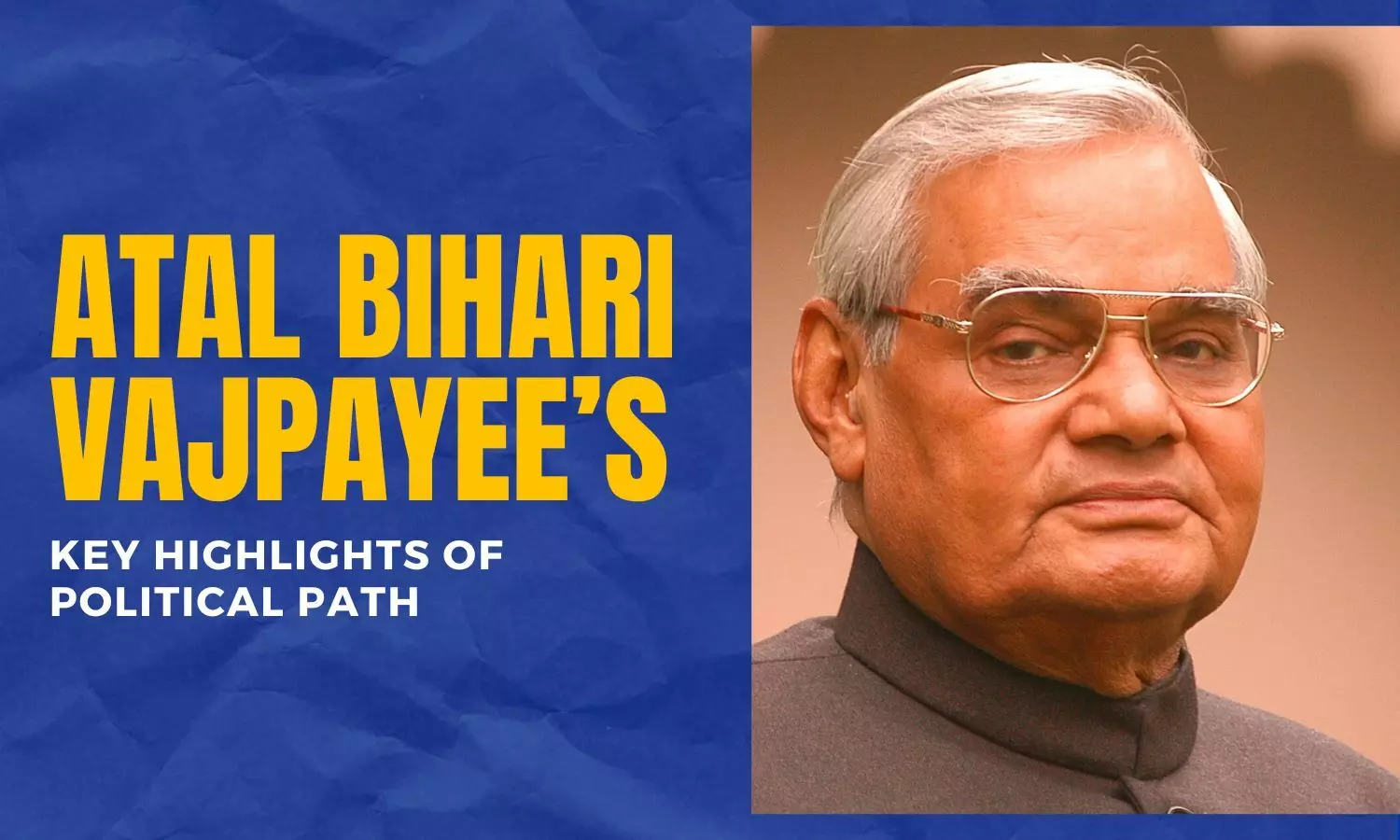Atal Bihari Vajpayee’s key highlights of political path
Explore the incredible Atal Bihari Vajpayee’s political tribulations, achievements, and endeavours.
Atal Bihari Vajpayee’s key highlights of political path

Vajpayee was fully committed to India’s national interests over anything else. He was a great statesman, poet, and orator. He truly transformed the image of India’s modern state. His amazing contributions towards Indian democracy, diplomacy, politics, and development were many and are worthy to be remembered in his biography.
Political System; Of India, Containment; and Poetry
Vajpayee joined Rashtriya Swayamsevak Sangh (RSS) in 1939 when he was only 15. He eventually became one of its general secretaries who were very strong due to the expansion of the party. Vajpayee with his like minded allies formed, in 1951, Vishal Bharatiya Jan Sangh, which represented the political wing of RSS in India. He was constantly supporting nationalist movements in college, which resulted in thrusting his political involvement during his early years.
In the 2nd general elections, in India held in 1957, he contested and won the seat from Balrampur, Uttar Pradesh. This was his first parliamentary career from which he could grow further with immense possibilities. His BJP stance gives him the credibility to freely communicate his points of view which in turn captures Prime Minister Jawaharlal Nehru’s attention where he openly states how Vajpayee is well fit to be India’s future PM.
Formation of the Bharatiya Janata Party
The Emergency period (1975–77) imposed by Indira Gandhi marked a turning point in Vajpayee's political career. Alongside other opposition leaders, he played a significant role in resisting authoritarianism. Following the end of the Emergency, Vajpayee became the Minister of External Affairs in the Janata Party government led by Morarji Desai.
However, ideological differences within the Janata Party led to the formation of the Bharatiya Janata Party (BJP) in 1980, with Vajpayee as its founding president. Under his leadership, the BJP laid its foundation as a nationalist party advocating Hindutva, economic reforms, and good governance.
The 1996 Prime Ministerial Stint
One of the most significant milestones in Vajpayee’s political career came in 1996 when he became India’s 10th Prime Minister. Though his tenure lasted only 13 days due to the lack of a parliamentary majority, this brief stint showcased his democratic principles as he gracefully resigned rather than engage in horse-trading for support.
1998–2004: A Transformational Era
Vajpayee returned to power in 1998, leading a coalition under the National Democratic Alliance (NDA). His tenure as Prime Minister between 1998 and 2004 is remembered as a transformative era for India.
1. Pokhran-II Nuclear Tests (1998): One of Vajpayee’s decisive steps included a series of Nuclear Tests held in Pokhran, located in Rajasthan. This single act resulted in India being recognised as a nuclear state, asserting its strategic independence. In addition with international sanctions, Vajpayee had diplomatic moves which ensured India’s global stature intact.
2. Kargil War (1999): During the Kargil war where the Indian Army was able to stop Pakistan from making any further domestic incursions, Vajpayee displayed exemplary leadership qualities. His strong utterances as well as support for the soldiers made him a popular man.
3. Lahore Declaration (1999): In the quest of normalising relations with Pakistan, Vajpayee initiated the visit to Lahore in an attempt to sign the Lahore Declaration. Although there was a peace process in place he undertook a long treasured bus trip to Lahore. In this restoration of peace there were some serious setbacks but still going by his resolve they did reinforce his determination for regional order.
4. Economic Reforms: There were keen rounds of economic reforms brought by Vajpayee’s government that can be tagged as liberalisation ones, that aimed at privatisation as well as turning India’s infrastructure around. His most audacious project which bears his imprint is still the Golden Quadrilateral project whose objective was to expand the country’s road network.
5. Telecom Revolution: The policies that were put into place under Vajpayee’s era placed the platform for India’s telecom revolution and the millions who have since mobile connectivity have catalysed and contributed to economic growth.
Adversity and Determination
He never lost sight of secularism nor did he ever deviate from his devotion; all would agree that Mr. Vajpayee’s efforts during the communal conflict during the 2002 Gujarat riots were commendable. His honesty and respect earned him by his people enabled him maintain streamlined relations with government functionaries and nation.
Vajpayee’s Political Career and Retirement
Vajpayee was a famous poet, and to him ideas were not dry abstractions, but poetry served to explain in profound words the essence of the idea. As most of his works do, Meri Ekyaavan Kavitayein showcases human feelings and life comprehension in Vajpayee.
Vajpayee disappeared from the political scene in 2004 after suffering defeat in the general elections, about which meeting and speaking his loyal subjects were great souvenirs of unmatched wisdom and integrity. He was awarded Bharat Ratna in 2015, the most conspicuous Issar award for the great services rendered to the country.
Influence and Legacy
Although Atal Bihari Vajpayee died on the 16th of August, 2018, he left behind a legacy that still sustains. His evidently remarkable leadership skills enabled him to focus on key aspects such as development while still being a mediator across the political spectrum. His adherence to democratic ideals transcends over time; these qualities serve as a great source of inspiration.
Conclusion
Atal Bihari Vajpayee’s political growth stands true to his sight, his determination and commitment he had for the country. His timeline from roots he came from to attaining a position as one of the most loved Prime Ministers of India proves the imprints he left behind in the political, the economical or the Johannesburg society as a whole. The legacy he left will remain to be an inspiration for leaders striving to strengthen their India more in turn bridging the gap.

